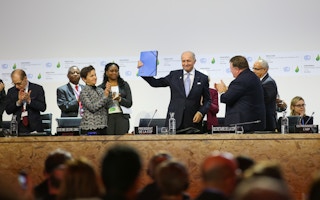COP21, the UN summit on climate change now unfolding here, declared Saturday a “day of action.” Inevitably, it was a day of words: words that called to action, words that outlined the ideals of action and – in some cases – accounts of action already launched.
At the close of the first week of COP21 delegates finally agreed the words of the text that will be submitted to ministers, who must now decide upon action, and that decision, too, is likely to be accompanied by fast talking and fine words.
But those delegates who attended the day did hear about action. In a week in which governments and international agencies had promised US$4bn towards the restoration of 50 million hectares of land in the Sahara and the Sahel – a “great green wall” that will help sequester 250 million tonnes of carbon that would, left in the atmosphere, fuel further global warming – the focus turned to forests.
The American actor Sean Penn spoke up for the all-but-vanished forests of Haiti. This was, he said, not only the poorest country in the western hemisphere but the poorest in the world: twice as poor as the next poorest country, and one devastated by one of the world’s most destructive earthquakes in 2010.
Dream no more
The J/P Haitian Relief Organisation of which he was a co-founder had a ten-year plan to restore the forest ecosystem, incentivise a civilian protection corps, and help Haitians to enrich their own soils in a community project driven by Haitians, with international support.
“It is no longer time for dreaming,” he said. “Ten years from today we will be looking at a country that has gone from import dependence to an export economy.” And he ended: “With your help, here come the trees.”
There was a firmament of political luminaries. The global forests are home to more carbon than the entire atmosphere: they are a vital part of the climate machine. Yet, said Tine Sundtoft, Norway’s minister of climate and the environment, the area of two soccer fields was cleared every minute; 2,880 soccer fields every day.
The consequences for the climate were devastating, and Norway had invested $400m a year to help preserve the forests from agriculture, logging, miners and other asset-strippers. “It is not just a matter of ethics, it is a matter of survival,” she said.
The action COP
The word “action” recurred, repeatedly, during the word-feast that marked COP21’s Day of Action. French minister of foreign affairs Laurent Fabius promised that this Paris meeting would be remembered as the “action COP”. The executive secretary of the UN Framework Convention on Climate Change, Christiana Figueres, described the day as a “fantastic celebration of the right thing to do” and urged delegates to move from “an action day to an action world”.
The French environment minister, Ségolène Royal, pointed out that humans were dumping prodigious quantities of greenhouse gas into the atmosphere as they burned fossil fuels; they were pushing up sea levels as the planet warmed and the icecaps melted, and they were comprehensively destroying biodiversity and polluting the oceans with plastic waste. “We don’t have three different planets,” she said.
Winnie Byanyima, director of Oxfam International, spoke up for the poorest, the first victims of climate change. In a world in which water would become more scarce in the already dry lands, African women invested 40 billion hours a year collecting water and carrying it to their villages, and the $1.5bn made available in aid for small farmers provided about $3 per person per year.
A village farmer in Uganda took 180 years to emit the same volume of carbon dioxide as one American citizen emitted in one year. She had one message for the developed nations that had launched, and profited from, the fossil fuels revolution that began in the United Kingdom in 1750: “Pay your fair share.”





















